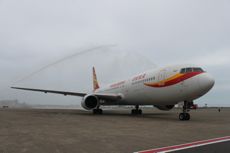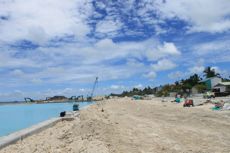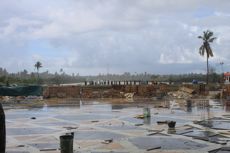Senior members of Moreway Construction Company and the National Disaster Management Center (NDMC) have been implicated by employees of NDMC and the French Red Cross (FRC) for their alleged corrupt involvement in a 2005 Laamu Gan tsunami housing project.
“Moreway is a scapegoat for forgeries and fabrications committed by the Arif brothers Ahmed and Abdullah, and Mohamed ‘Dhigali’ Waheed,” alleged one member of the business community familiar with the individuals, who wishes to remain anonymous.
Dhigali is a former shareholder and current executive manager of Moreway Construction. Ahmed Arif owns Apollo Holdings Company, which has been linked to Moreway, while Abdullah Arif, formerly director of Moreway Arun Excello, today holds shares in Lotus Company.
The Anti-Corruption Commission (ACC) recently entered NDMC with police forensics experts to review files relating to a Rf18 million (US$1.16 million) payment issued to Moreway by the government in May. The ACC stopped a second payment of Rf15 million (US$973,000) in August on suspicion of corruption.
In 2005, the FRC tendered a US$7 million post-tsunami housing project for Laamu Gan, accepting bids from several companies, including Moreway, in a joint venture with Indian company Arun Excello and local company Aima. Although the project initially proposed 460 houses, complaints of insufficient conditions and finances prompted the FRC to reduce that number to 240.
NDMC Senior Project Manager Mohamed Waheed said Moreway’s complaints of insufficient financing and obstacles to construction prevented the company from fulfilling its contract, although at the time, claimed Waheed, imported materials were duty-free. A former employee of the French Red Cross, Adam, added that Red Cross site inspections and budget plans were nearly fool-proof. But “they were always demanding money from FRC, they had all kinds of excuses,” said Waheed.
Meanwhile, Arun Excello had abandoned the project mid-way due to frustrations with Moreway, incurring a loss of US$300,000.
Representatives at Arun Excello had not responded to inquiries at time of press.
After building 80 houses, Moreway’s contract was terminated by the FRC and the project handed over to Maldives Transport and Contracting Company (MTCC) under the government’s remit.
Moreway was subsequently sued by NDMC on behalf of the Maldivian government for losses incurred by the unfinished project. In November 2007, the Civil Court delivered a verdict requiring Moreway to pay US$2.3 million to the government and granting NDMC the right to sell Moreway property at their construction site if the money was not paid within one month.
Sources say the money, due four years ago, has not yet been paid.
“Misleading” letters
Although payments were released to Moreway this year by the Finance Ministry, Waheed claimed that the government has been misinformed.
On April 19, 2011, Deputy Minister of Housing and Environment Ahmed Zaki sent a letter to Finance Minister Ahmed Inaz stating that a sixth invoice submitted by Moreway in March 2007 had yet to be paid, and requested that the ministry release the funds.
In response, Inaz said budget constraints prevented the money being allocated to NDMC, “so, money is to be paid from the NDMC budget.”
Further letters obtained by Waheed illustrate government confusion around the issue. In what Waheed called “misleading letters” between the Finance Ministry and NDMC, NDMC personnel requested the government to pay expired contractor invoices for a project which it had not tendered. At Zaki’s suggestion, the Finance Ministry reallocated money for current housing projects in Dhuvaafaru and Vilufushi to facilitate these payments, which were made using the current dollar-rufiyaa exchange rate.
Although the first payment voucher, processed in May, required Mohamed Waheed’s authorisation, his name had been crossed out and replaced by Deputy Minister Adam Saaed’s, who authorised the voucher along with Zaki.
Asked why this had been done, Waheed speculated that “they thought I wouldn’t sign it, and since Saeed is a friend of Zaki’s they had him sign it. I don’t think he even knew about it, maybe he signed it without thinking much.”
Meanwhile, documents used to obtain these payments are in dubious standing. Waheed points out that only copies were submitted to the Finance Ministry. “Who will accept invoice copies these days? Not even a small child!”
FRC officials also pointed out that the invoices had long been considered invalid.
Emails exchanged between Waheed, FRC senior project manager Brett Campbell and FRC construction coordinator Xavier Chanraud confirmed that all legitimate invoices from Moreway had been paid in full by the time FRC closed its housing projects and left the Maldives.
Chanraud recently stated that, “The FRC has closed all of its housing projects in the Maldives years ago and has already paid 100 percent of its contracts value through NDMC, which includes all defect liability retentions to the contractors. I do not think those invoices are still eligible, especially if rejected four years ago by the NDMC for technical reasons.”
Campbell added that the Civil Court’s verdict against Moreway indicated that “not further payments were due to Moreway.”
In reference to requests for additional payments for access road construction, Campbell said those claims were “discussed at length” and “deemed to be a contractor’s cost.”
Then NDMC Chief Coordinator Abdulla Shahid allegedly rejected the invoices at the time on similar grounds.
“It is questionable how these invoices made headway into NDMC budget section [in 2011],” Waheed wrote in a statement. “These are not outstanding payments to Moreway as one would think and FRC does not recognise these invoices as pending.”
When the invoice for a second payment was authorised by Zaki and NDMC chief coordinator Sheikh Ilyas Hussain and submitted to the Finance Ministry, Inaz questioned its validity against Moreway’s pending debt to the government.
Zaki then took the invoice with comments from NDMC Finance Director Mohamed Shiyam’s desk and passed a new copy to someone else for processing, Waheed alleged. Copies of both invoices with clear discrepancies were shown to Minivan News in private interviews.
The Maldives’ current Red Cross affiliate office, the International Federation of Red Cross (IFRC), was unable to comment on the case.
A blind spot
Sources at NDMC and formerly the FRC agreed the previous regime’s corrupt reputation has left the current government with a blind spot.
“At the time, the government was too corrupt to get money for projects,” said Waheed. “So the FRC was funding the project, but after Moreway could not complete the project FRC left and the government stepped in.”
Government bias may have pervaded the project from the start, however. Moreway’s original bid was rejected over a fake bank guarantee, Waheed pointed out, and the company had to go to court to clear its name before re-submitting its bid.
“This is how things were done then, I don’t know why Moreway was selected but that was Gayoom’s regime,” he said.
Internal complications at the Red Cross were also rumored, although a source familiar with the operation could not confirm the reports.
For Adam, the central issue in the Moreway case is ignorance. “GoM does not understand the discrepancies in payments and procedures, and has not been properly informed of the project, so it is being charged for variations that were not approved by FRC,” he said.
According to Adam, the “local procedure” leaves project tendering and awarding to the Ministry and does not include consultants. It is “the only procedure Maldivians know,” and supports a “culture of embezzling state funds” whereby invoices are frequently submitted, rarely checked, and often paid.
FRC’s procedure is more meticulous and independent, Adam explained. Consultants are included in the bid review process, and officials at local and international FRC offices review projects alongside NDMC officials and consultants.
Had the government been more aware of FRC’s procedures, Adam said it would have noticed that the recently-paid invoice had not been signed by a consultant or passed through the review process at FRC.
The trickle-down effect
Distribution of the Rf18 million (US$110,000) is unclear. One source said it was obvious to anyone familiar with the business community that Dhigali “has profited personally, that he is a crooked businessman is known across the whole Maldives.”
A source familiar with the business community implicated Dhigali in a check fraud case involving companies Apollo and Lotus. The Arif brothers are currently shareholders in Lotus, and were allegedly issued a bad check by Apollo, in which Dhigali is a shareholder.
Other sources believe that anyone involved in processing the payments has also received a share.
The Arif brothers, said to have split associations with Dhigali earlier this year, were reportedly unaware that the payments were made. Ahmed Arif avoided scheduled interviews with Minivan News, and Dhigali did not respond to phone calls.
To date, Moreway’s debt of US$2.3 million has not been paid.
Breaking the Silence
“This is a big fraud and corruption case involving senior members at the government and at NDMC,” said Waheed, who said he suspects political tensions could make the ACC’s investigation difficult. “I’ve told Ilyas and Zaki not to do this. But Ilyas said he is helpless because he is not part of the ruling party. Zaki is MDP, though, and I think the two don’t want to have a conflict.”
While Waheed believes the ACC “is now more professional than before, and we should attach some faith to their investigation,” he chose not to report his findings to the commission.
Instead, he wrote to the President. “Because this involves so many government members I thought it was best to go to the government first, before reporting anything to an outside body. But when I spoke with them they were nervous, they didn’t want this thing to be talked about.”
Minister Inaz had not responded to phone calls at time of press, and Ilyas refused to speak to Minivan News. Deputy Minister Zaki denied all allegations.
ACC’s investigation of NDMC is currently underway.
Correciton: Previously, this article stated “Zaki then took the invoice with comments from Inaz’s desk and passed a new copy to someone else for processing.”
It should have read, “Zaki then took the invoice with comments from NDMC Finance Director Mohamed Shiyam’s desk and passed a new copy to someone else for processing.”
Likes (1)Dislikes
(1)Dislikes (0)
(0) 




